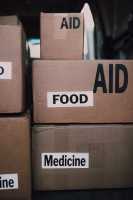
18 Aug Violence and War Eclipse Drought As Major Source of Food in Africa
MedicalResearch.com Interview with:

Dr. Anderson
Dr. Weston B Anderson PhD
Postdoctoral Reasearch Scientist
International Research Institute for Climate and Society
The Earth Institute
MedicalResearch.com: What is the background for this study? What are the main findings?
Response: We find that while drought continues to be a consistent trigger of food crises in Sub-Saharan Africa, protracted conflict has become relatively more important over the last decade.
We furthermore find that pastoral livelihoods have taken longer to return to food secure conditions following droughts as compared to agricultural livelihoods.
MedicalResearch.com: What should readers take away from your report?
Response: The number of people experiencing food insecurity has been steadily increasing in recent years. Past food crises have demonstrated that our ability to prepare for and respond to natural disasters is compromised in areas of protracted violence. Our study highlights that violence as a trigger of food insecurity has been steadily rising over the past decade. If these trends persist, the work of preventing droughts and floods from leading to food crises will become significantly more difficult. We found that the conflicts in Nigeria, South Sudan, and, to a lesser extent, Somalia most significantly contributed to the increase in violence-triggered food crises. Countries across East Africa, however, experienced significant food insecurity as a result of drought.
Furthermore, we demonstrate that droughts tend to lead to more persistent and widespread food crises in pastoral zones as compared to agricultural zones. This reflects what we would expect from previous studies, including household-level surveys, demonstrating that post-drought herd reconstruction may take months to years. Our analysis adds value by demonstrating that pastoralists are more likely to remain food insecure for longer during this time.
MedicalResearch.com: What recommendations do you have for future research as a result of this work?
Response: We still have a tremendous amount to learn about how drought and conflict lead to food insecurity, particularly when they co-occur.
MedicalResearch.com: Is there anything else you would like to add?
Response: Our study does not diminish the possibility that climate change will contribute to increasingly frequent droughts that may cause spikes in hunger in Africa in the future, particularly in southern Africa and Madagascar where we know climate change will lead to increasingly frequent drought. While climate change has not been driving the increases in hunger from 2009-2018 in Sub-Saharan Africa, which is the coverage of our study, it very well may be contributing to other ongoing hunger crises outside of our study region or time period.
Citation:
Weston Anderson, Charles Taylor, Sonali McDermid, Elisabeth Ilboudo-Nébié, Richard Seager, Wolfram Schlenker, Fabien Cottier, Alex de Sherbinin, Dara Mendeloff, Kelsey Markey. Violent conflict exacerbated drought-related food insecurity between 2009 and 2019 in sub-Saharan Africa. Nature Food, 2021; DOI: 10.1038/s43016-021-00327-4
[subscribe]
[last-modified]
The information on MedicalResearch.com is provided for educational purposes only, and is in no way intended to diagnose, cure, or treat any medical or other condition. Always seek the advice of your physician or other qualified health and ask your doctor any questions you may have regarding a medical condition. In addition to all other limitations and disclaimers in this agreement, service provider and its third party providers disclaim any liability or loss in connection with the content provided on this website.
Last Updated on August 18, 2021 by Marie Benz MD FAAD
